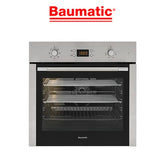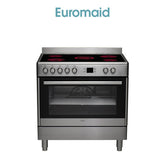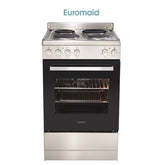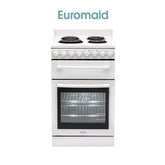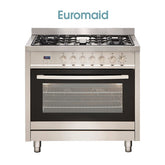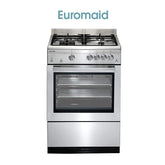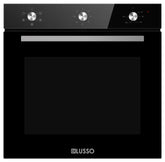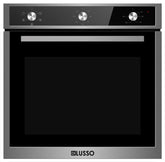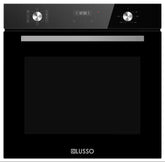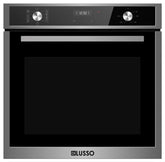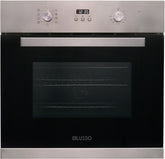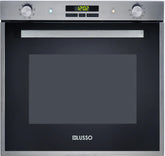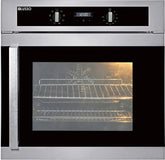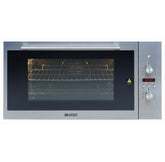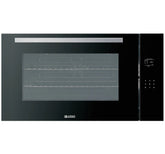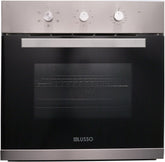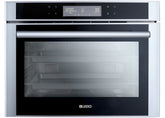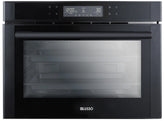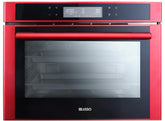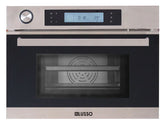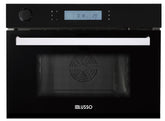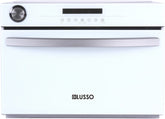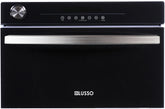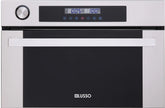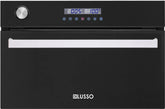Filter
25 results
80
- 10
- 15
- 20
- 25
- 30
- 50
- 80
Best selling
- Featured
- Best selling
- Alphabetically, A-Z
- Alphabetically, Z-A
- Price, low to high
- Price, high to low
- Date, old to new
- Date, new to old
Sort
Sort by:
- Featured
- Best selling
- Alphabetically, A-Z
- Alphabetically, Z-A
- Price, low to high
- Price, high to low
- Date, old to new
- Date, new to old
-
BEAUMATIC RMO7 Studio Solari 60cm 9 Function OvenThis stylish oven features a black glass door with a stainless stell control panel and handle. It also has easy-to-use knob controls. The large 81 litre capacity interior, combined with 7 flexible cooking functions including a fan forced function which enables multi-level cooking with...
- $899.00
- $899.00
- Unit price
- / per
-
EUROMAID CS90S 90cm Stainless Steel Electric Oven + Ceramic CooktopDescription Euromaid CS90S offers a 5 zone ceramic cooktop with 2 extended zones for larger saucepans or higher heat and an electric programmable oven to programme your cooking times and temperatures. The 113 litre capacity oven provides a roomy interior for all...
- $2,499.00
- $2,499.00
- Unit price
- / per
-
EUROMAID EFF54SS 54cm Upright Cooker/Stove, Electric Single Cavity Oven & Solid CooktopThe single cavity 540mm cooker is the perfect little workhorse. Popular as a replacement model or ideal for a rental, holiday home or family kitchen. The EFF54SS has everything you require in a freestanding unit. An electric oven with a large viewing window...
- $2,299.00
- $2,299.00
- Unit price
- / per
-
EUROMAID F54RW 54cm Upright Stove, Electric Oven & Coil CooktopPart of our successful project, this range offers 540mm cookers that are the benchmark in the industry and offer reliable performance, affordable style and added safety features. The 83 litre capacity is the highest in its class enabling hassle free cooking for a crowd...
- $1,449.00
- $1,449.00
- Unit price
- / per
-
EUROMAID GE9SS 90cm Stove/Cooker ? Electric Oven & Gas CooktopHighly featured, with a popular commercial look, Euromaid GE9SS, 90cm Stove/Cooker – Electric Oven & Gas Cooktop has looks as well as function. The GE9SS offers duel fuel cooking with highly efficient quality gas burners and twin wok cooking. An electric programmable oven means...
- $2,399.00
- $2,399.00
- Unit price
- / per
-
EUROMAID GEGFS60 60cm Gas Oven & Gas StoveDescription Euromaid GEGFS60 – 60cm Gas Oven & Gas Stove is an oven for those that love cooking with gas. The gas burners have our flame failure safety feature that ensures that if the flame is accidentally extinguished the gas supply will automatically turn...
- $2,299.00
- $2,299.00
- Unit price
- / per
-
ELECTRIC OVEN - 600MM 5 FUNCTIONDIMENSIONS 595(W) x 596(H) x 576mm (D) FINISH - EXTERIOR Black glass Triple glazed door FINISH - INTERIOR High grade easy clean enamel CAPACITY 82L gross POWER SOURCE Electricity 10amp plug in FUNCTIONS FEATURES 5 functions with mechanical timer 120min cooking timer Oven ventilation...
- $869.00
- $869.00
- Unit price
- / per
-
ELECTRIC OVEN - 600MM 5 FUNCTIONDIMENSIONS 595(W) x 596(H) x 576mm (D) FINISH - EXTERIOR Black glass with stainless steel trim Triple glazed door FINISH - INTERIOR High grade easy clean enamel CAPACITY 82L gross POWER SOURCE Electricity 10amp plug in FUNCTIONS FEATURES 5 functions with mechanical timer...
- $839.00
- $839.00
- Unit price
- / per
-
ELECTRIC OVEN - 600MM 9 FUNCTIONDIMENSIONS 595(W) x 596(H) x 576mm (D) FINISH - EXTERIOR Black glass Triple glazed door FINISH - INTERIOR High grade easy clean enamel CAPACITY 82L gross POWER SOURCE Electricity 15amp plug FUNCTIONS FEATURES 9 functions 2 x fully extendable telescopic rails Digital touch control...
- $1,389.00
- $1,389.00
- Unit price
- / per
-
ELECTRIC OVEN - 600MM 9 FUNCTIONDIMENSIONS 595(W) x 596(H) x 576mm (D) FINISH - EXTERIOR Black glass with stainless steel trim Triple glazed door FINISH - INTERIOR High grade easy clean enamel CAPACITY 82L gross POWER SOURCE Electricity 15amp plug FUNCTIONS FEATURES 9 functions 2 x fully extendable telescopic...
- $1,369.00
- $1,369.00
- Unit price
- / per
-
ELECTRIC OVEN - 600MM 8 FUNCTIONDIMENSIONS 595(W) x 595(H) x 575mm(D) FINISH - EXTERIOR Fingerprint resistant Stainless Steel Triple glazed door FINISH - INTERIOR High grade easy clean enamel CAPACITY 70L POWER SOURCE Electricity 15amp plug in FUNCTIONS FEATURES 8 cooking functions LED fully programmable timer Digital clock Finger...
- $1,399.00
- $1,399.00
- Unit price
- / per
-
ELECTRIC OVEN - 600MM 75L SS 7 FUNCTIONIMENSIONS 595 (W) x 595(H) x 565mm(D) FINISH - EXTERIOR Fingerprint resistant Stainless Steel FINISH - INTERIOR High grade easy clean enamel CAPACITY 75L POWER SOURCE Electricity 15amp plug in FUNCTIONS FEATURES 7 cooking functions 2 telescopic rails LED fully programmable timer Digital clock...
- $1,899.00
- $1,899.00
- Unit price
- / per
-
ELECTRIC OVEN - 600MM 8 FUNCTION SIDE OPENINGDIMENSIONS 595(W) x 596(H) x 576mm(D) FINISH - EXTERIOR Fingerprint resistant Stainless Steel Triple glazed door FINISH - INTERIOR High grade easy clean enamel CAPACITY 67L POWER SOURCE Electricity 15amp FUNCTIONS FEATURES 8 cooking functions with programmable timer Reversible side opening door Digital clockErgonomic...
- $1,399.00
- $1,399.00
- Unit price
- / per
-
ELECTRIC OVEN - 900MM SS 9 FUNCTIONDIMENSIONS 895(W) x 475(H) x 568mm(D) FINISH - EXTERIOR Fingerprint resistant Stainless Steel Triple glazed cool touch door FINISH - INTERIOR High grade easy clean enamel CAPACITY 100L POWER SOURCE Electricity 15amp plug FUNCTIONS FEATURES 9 functions Rotisserie Programmable digital timer (up to 23hrs...
- $1,949.00
- $1,949.00
- Unit price
- / per
-
ELECTRIC OVEN - 900MM BLACK GLASS 12 FUNCTIONIMENSIONS 895(W) x 475(H) x 568mm(D) FINISH - EXTERIOR Black glass door and display panel Triple glazed cool touch door FINISH - INTERIOR High grade easy clean enamel CAPACITY 100L POWER SOURCE Electricity 15amp plug FUNCTIONS FEATURES 12 functions Full digital touch controls Rotisserie...
- $2,099.00
- $2,099.00
- Unit price
- / per
-
ELECTRIC OVEN - 600MM 5 FUNCTIONS (COMMERCIAL ORDERS ONLY)DIMENSIONS 595(W) x 595(H) x 575mm (D) FINISH - EXTERIOR Fingerprint resistant Stainless Steel Triple glazed door FINISH - INTERIOR High grade easy clean enamel CAPACITY 70L POWER SOURCE Electricity 10amp plug in FUNCTIONS FEATURES 4 cooking functions with mechanical timer 120min cooking timer...
- $759.00
- $759.00
- Unit price
- / per
-
FREESTANDING COMBI STEAM OVEN - SILVERDIMENSIONS 490(W) x 415(D) x 380mm(H) FINISH - EXTERIOR Silver and Black FINISH - INTERIOR Full Stainless Steel Triple Glazed Door CAPACITY 28L FEATURES Steam, High Temperature Steam, Steam Assist, Convention and Grill functions Programmable steam combi functions Table top design Digital touch LCD...
- $1,499.00
- $1,499.00
- Unit price
- / per
-
FREESTANDING COMBI STEAM OVEN - BLACKDIMENSIONS 490(W) x 415(D) x 380mm(H) FINISH - EXTERIOR Black FINISH - INTERIOR Full Stainless Steel Triple Glazed Door CAPACITY 28L POWER SOURCE 10 Amp plug in FEATURES Steam, High Temperature Steam, Steam Assist, Convention and Grill functions Programmable steam combi functions Table top...
- $1,599.00
- $1,599.00
- Unit price
- / per
-
FREESTANDING COMBI STEAM OVEN - REDDIMENSIONS 490(W) x 415(D) x 380mm(H) FINISH - EXTERIOR Red and Black FINISH - INTERIOR Full Stainless Steel Triple Glazed Door CAPACITY 28L POWER SOURCE 10 Amp plug in FEATURES Steam, High Temperature Steam, Steam Assist, Convention and Grill functions Programmable steam combi functions...
- $1,599.00
- $1,599.00
- Unit price
- / per
-
BUILT IN COMBI STEAM OVEN - STAINLESS STEELDIMENSIONS 597(W) x 480(D) x 458mm(H) FINISH - EXTERIOR Fingerprint Resistant Stainless Steel FINISH - INTERIOR Full Stainless Steel Triple Glazed Door CAPACITY 45L POWER SOURCE Electricity 15amp plug in FEATURES Steam, Fan Forced and Grill functions Programmable cooking functions Digital touch LCD controls...
- $1,999.00
- $1,999.00
- Unit price
- / per
-
BUILT IN COMBI STEAM OVEN - BLACK GLASSDIMENSIONS 597(W) x 480(D) x 454mm(H) FINISH - EXTERIOR Black Glass FINISH - INTERIOR Full Stainless Steel Triple Glazed Door CAPACITY 45L POWER SOURCE Electricity 15amp plug in FEATURES Steam, Fan Forced and Grill functions Programmable cooking functions Digital touch LCD controls Water reservoir...
- $2,199.00
- $2,199.00
- Unit price
- / per
-
FREESTANDING STEAM OVEN - WHITE GLASSDIMENSIONS 539(W) x 393(H) x 459mm(D) FINISH - EXTERIOR Full White Glass FINISH - INTERIOR Full Stainless Steel CAPACITY 33L POWER SOURCE Electricity 10amp plug in FEATURES Tabletop plug in design - able to fit into most microwave cabinets Extra large oven capacity Digital...
- $1,399.00
- $1,399.00
- Unit price
- / per
-
FREESTANDING STEAM OVEN - BLACK GLASSDIMENSIONS 539(W) x 393(H) x 459mm(D) FINISH - EXTERIOR Full Black Glass FINISH - INTERIOR Full Stainless Steel CAPACITY 33L POWER SOURCE Electricity 10amp plug in FEATURES Tabletop plug in design - able to fit into most microwave cabinets Extra large oven capacity Digital...
- $1,399.00
- $1,399.00
- Unit price
- / per
-
BUILT IN STEAM OVEN - STAINLESS STEELDIMENSIONS 597(W) x 395(H) x 460mm(D) FINISH - EXTERIOR Finger print resistant Stainless Steel FINISH - INTERIOR Full Stainless Steel CAPACITY 33L POWER SOURCE Electricity 10amp plug in FEATURES Extra large oven capacity Digital touch LED controls Water reservoir can be topped up during...
- $1,699.00
- $1,699.00
- Unit price
- / per
-
BUILT IN STEAM OVEN - BLACK GLASSDIMENSIONS 597(W) x 395(H) x 460mm(D) FINISH - EXTERIOR Full Black Glass FINISH - INTERIOR Full Stainless Steel CAPACITY 33L POWER SOURCE Electricity 10amp plug in FEATURES Extra large oven capacity Digital touch LED controls Water reservoir can be topped up during use Patented...
- $1,799.00
- $1,799.00
- Unit price
- / per
